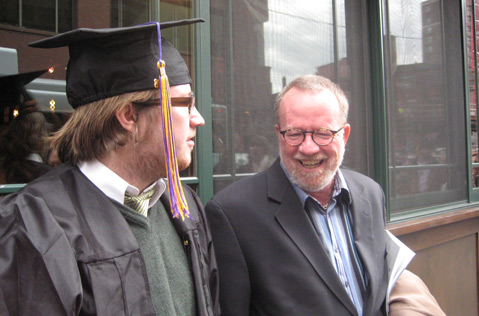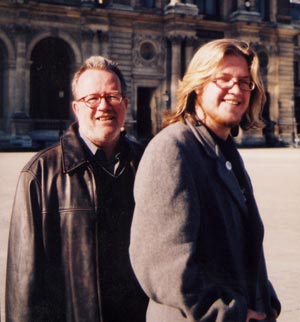Fatherly Love
A Papa Deals with the Philosophical Problem of Pride

Pride is supposed to be a bad thing. It comes before the fall. It’s one of the deadly sins, and, apparently, a close cousin to prejudice, too. On the whole, supposedly despicable. Yet what am I supposed to do with all this hubris welling in here for my son Zac, who graduated from Emerson College last week, 3,000 miles away from home?
That’s right: The irrepressibly prodigious boy many remember as my coanchor for G-rated movie review columns in The Independent during the balmy Clinton years-which turned out to be a kind of Silver Age for the family film-that Zac, to the joy of his mother and me, has now earned a Bachelor of Fine Arts degree with an emphasis on animation production. The upstart critic has become an artist: My boy.
After a lot of thought, I’ve decided to go with the pride. What’s more, I’m determined to eschew any guilty residue, too, actively disregarding the karmic repercussions raised by either Aristotle or Sister Mary Aidan, first grade ethicist. I am proud of Zac, and I’ve already told him so. So, ergo, ipso facto, I’m damned for it in this world and, if there is one, probably the next.
Bring it on, I say, though I know precious few precedents, here. My own father, former charter member of the greatest generation, spent little time lavishing embarrassing emotions on moi except at my First Holy Communion. (Catholicism: Huh?) Of course it made me glow momentarily, but at the time, I also thought, what’s the big deal? I just learned a few lines of catechism and stuck out my tongue at the right moment. It was harder and took more faith to learn to ride a two-wheeler. And not even my mom was impressed with that.

Below: Zac's graduation from Emerson College this June.
But we are speaking about my son, here, who has had pride heaped on him rather fulsomely during his first 23 years. I’m not too proud to admit, I tended to gush over his juvenilia art work, his incisive early essays about our near mythically intelligent dog, Claire, and his early mastery of a buttery No»l log recipe. It’s not just academic or cuisinal achievement that unleashed floods of praise, though. During his life, he has done many brave and unselfish things worthy of note. He jumped off a waterfall into an ice cold pool, swam with a dolphin, volunteered to accompany me to the three-hour-plus Kenneth Branagh Hamlet film and stayed past the intermission to its admittedly satisfying sword fight. He, the son of a man who fears the phrase “hand tools,” was the first paid youth artist in residence at Summer Solstice. At each occasion, I was proud to signify my pride.
Okay, I know, gushing may have a down side. A coin can be debased by too frequent use, the home version of grade inflation. Even Zac reproached me for this after I once drew favorable attention to a drawing he did, which disappointed him. Only I saw its visionary composition. “Yeah, but you think everything I do is great,” he said.
I wanted to say that it wasn’t true. I wracked my brain for some moment when his hands fashioned a mediocre product or his mind failed to express itself with alarming acuity. I failed. The boy who taught me how to use a computer mouse, and why Vampire Weekend sucks, and where to refill my iPod annually is clearly entitled to the mantle of genius I hereby readily grant. Yeah-huh.
Though, truth be told, I do wonder a little about the metaphysics of pride. It does seem to be one of the more self-reflective vices, even when focused on others. I mean, if I tell somebody, a near stranger, that I’m proud of them for some achievement, am I not implying a certain share in the glory? My friend was recently admitted to a prestigious program at UCLA, and I said, “I’m so proud of you,” meaning, you did good. But does it also imply our association is elevated by her newly-proven worthiness? I claim a certain shared greatness in such a transaction. As in, you did us proud.
Maybe that’s not too exquisitely (or bizarrely) reasoned when you apply it to my son. His BFA degree hinged on a project, a short animated film based on The Odyssey, titled Ten Minutes to Ithaca. Not only was it hilarious, beautiful, and witty, but it entailed hours of work and applied learning. I could never do it. But I not-so-secretly take credit, here, nonetheless: He’s flesh of my flesh, after all. And who, I ask you, used to read the poem to him, thrilling as his little eyes closed on visions of sea-monsters, Sirens, and bloody suitor revenge? Okay, his mother has all the drawing talent, but just the same :
Beyond joking, I’m most proud because our time together has closed us in a big usually successful net of interactions. We are almost extensions of each other while remaining independent. Though he lives a continent away, he tells me things and he asks me, sometimes, for advice, though that mostly consists of meatball recipes and quick edits of his last-minute (yet brilliant) college papers.
And I admire his differences. He loves to travel and spent his sophomore year in a castle outside of Amsterdam, learned the history of art in the museums of Europe. At his age I used to anguish over Greyhound trips to Los Angeles. He likes the television series Lost and can even explain why. He goes to the dentist without whining.
But even more, I selfishly prize the abilities he garnered at my side, the values I hoped to inculcate during our endless hours together taking in films as diverse as Monkey Trouble and The Nightmare Before Christmas. Never mind his great GPA, his professor-praised Blake essay, or the play he wrote that astonished even me. I know he has the ability to stand bravely alone in critical judgment.
“I just saw one of the best movies of my life,” he told me by phone from Boston late one recent night. It turned out, he was referring to Speed Racer, a kid’s film of technical dazzle that most critics in America could not understand, mostly hated. He loved it and wasn’t ashamed. “At times I felt like I was looking through the eye of God,” he breathlessly told me.
I was so proud.



